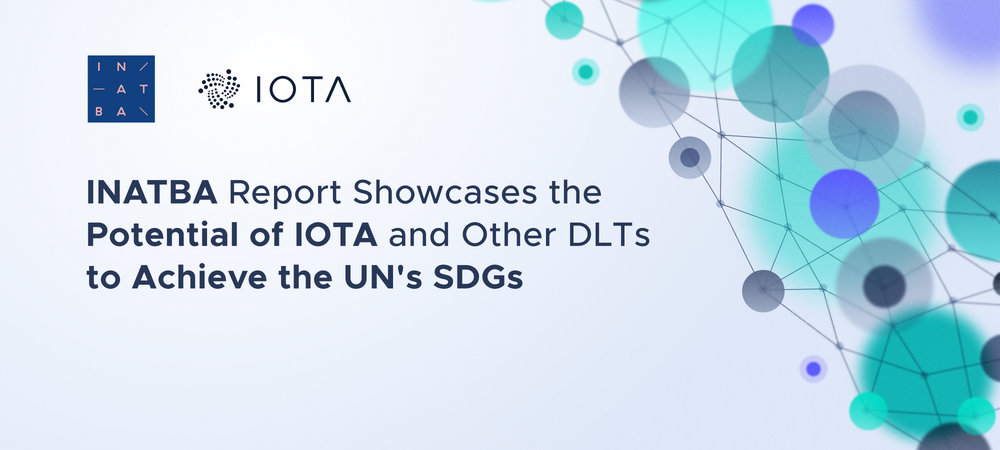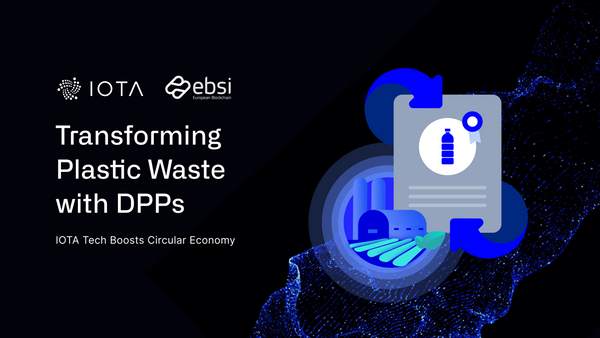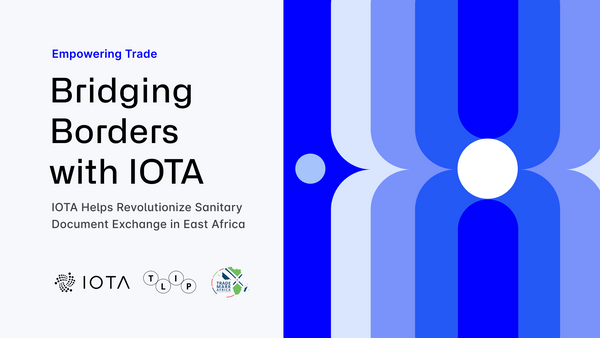INATBA Report Showcases the Potential of IOTA and Other DLTs to Achieve the UN's SDGs
Understanding the Impact of DLT on the Sustainable Development Goals and Other Social Impact Projects
TL;DR:
The report “Blockchain for Social Impact”, recently published by INATBA, demonstrates the potential of projects using IOTA and other DLTs to achieve the SDGs. The IOTA Foundation is excited to now be part of a new, INATBA-led initiative to develop a framework for social impact measurement among blockchain/DLT projects.
In 2019, the IOTA Foundation became one of the founding members of the International Association of Trusted Blockchain Applications (INATBA). In the pursuit of its mission to promote the global adoption of blockchain and distributed ledger technology (DLT), INATBA has engaged its members in 15 different Working Groups and Committees focused on assisting this objective within different sectors of the blockchain industry. Mariana de la Roche, Lead Project Manager at the IOTA Foundation, and Åsa Dahlborn, Project Administrator at the IOTA Foundation, are active members of INABTA’s Social Impact Working Group (SIWG), and Mariana was recently elected as co-chair of the Working Group. Additionally, Anja Raden, Head of Legal and Regulatory Relations at the IOTA Foundation, Tom Jansson, Legal Counsel at the IOTA Foundation, and Maitén Vilches, Junior Legal Counsel at the IOTA Foundation, are engaged in INABTA’s Finance Working Group.
The SIWG leverages member expertise to highlight the potential of blockchain/DLT in tackling social issues such as climate change, poverty, inequality, food waste, corruption, and other areas covered by the UN's Sustainable Development Goals (SDGs), a collection of 17 interlinked global goals designed to be, according to the UN, "a blueprint to achieve a better and more sustainable future for all".
Acknowledging the power of blockchain/DLT in this arena, Marc Taverner, Executive Director of INATBA, said: "Blockchain has tremendous potential to facilitate positive change within society. Adopting DLT-based solutions for pressing problems in the world today, including climate change, the pandemic, and global inequality, is a new and innovative way to tackle these issues."
The work of the SIWG closely aligns with the objectives of the IOTA Foundation, which include a focus on developing technologies that help improve society, as well as careful evaluation of the societal and environmental impact of these technologies.
Since its inception, the IOTA Foundation has been committed to social impact, both internally, with regards to the characteristics of its technology, and externally, with regards to the projects and initiatives that it is involved in or that it is developing:
- Internally, the technology behind IOTA inherently generates a positive social impact due to its key properties. IOTA’s Tangle architecture was designed to operate with minimal energy consumption, making it a sustainable DLT at its core. Moreover, the upgrade to the Chrysalis network earlier this year brought a significant decrease in transaction size and major efficiency improvements. To give an example, tests performed within IOTA during the Chrysalis development suggest that making one cup of coffee in a single-serve machine uses about 22,000 times more energy than a Raspberry Pi 4 node uses per IOTA message/transaction, including proof-of-work costs. In addition to making IOTA a sustainable technology, the low energy consumption also enables access to a wider range of users. The fact that IOTA applications can be used on low power devices such as smartphones makes the technology highly inclusive since no access to complex and high power devices is needed. As the creator of an open-source, free and permissionless DLT, the IOTA Foundation democratizes digital technologies, making sure that they are inclusive, accessible and resource-efficient. Anybody can comment or participate in this open-source and transparent environment.
- Externally, the IOTA Foundation is devoted to engaging in projects and initiatives that empower sustainable development and generate real-world impact, tackling challenges related to climate change, clean energies, smart cities and sustainable mining, among others. With a technology that can improve lives, empower people and transform industry, the IOTA Foundation collaborates with its community and partners to deliver sustainable, real-world impact.
Exploring IOTA use cases for social good
To better understand the objectives, challenges, and potential impact of blockchain/DLT use cases in tackling societal issues addressed by the SDGs, the SIWG conducted a survey in 2020 and 2021 entitled Blockchain for Social Impact.
Representatives from approximately 70 projects participated in the survey, which demonstrated a high level of engagement with SDGs among the surveyed projects. A significant part (roughly 25%) of the survey’s respondents affirmed that they are using the IOTA protocol in their projects to tackle societal issues. Examples of these projects include the following:
- A payment solution that ensures easy and low-cost access to pay-per-use applications without the necessity for a bank account. Payments are received directly on the operator's wallet, which increases transparency and creates trust. By assessing the problem of limited access to payment services due to barriers against entering the banking system, this initiative addresses several SDGs, including SDG 9 (“Industry, innovation and infrastructure”).
- A solution that facilitates investment in algae production through smart contracts. This project finances the growth of algae, ocean clean-up and further research and development into related areas. Several SDGs are addressed through this initiative – among others, SDG 6 (“Climate action”) and SDG 14 (“Life below water”).
- A solution supporting smallholder farmers to reduce their vulnerability to crop losses owing to climate change. Designed to work with existing supply chain apps that have other functionalities such as management operations, logistics, provenance and sustainability/certification status, the solution is also intended to be deployed as a supply chain management tool that could use tokenized Vulnerability Reduction Credits to reward projects that demonstrate climate-resilient farming practices, which provides social and environmental safeguards for all projects/smallholders involved. Through this solution, several SDGs – such as SDG 12 (“Responsible consumption and production”) and SDG 16 (“Peace, justice and strong institutions”) – are addressed.
- An initiative using a combination of satellite remote sensing, digital mapping services, AI and IOTA's DLT to predict the timing and likely future value of a harvest at the single farm level. This prediction model, referred to as a Harvest Digital Twin, supports small-scale farmers with microcredit services. It is ensured that only an identifiable farmer, currently connected to a single land-holding, can be given access to microcredit services that they will need to ensure a successful farming year. This initiative tackles not only SDG 3 (“Good health and well-being”) but also SDG 5 (“Gender equality”) since factors such as gender, age and educational background are irrelevant for the credit approval.
The IOTA Foundation is also engaged in several long-term projects that tackle environmental issues, such as the DMRV project, which was launched through its strategic partnership with ClimateCHECK. The jointly-developed tool for streamlining and digitizing measurement, reporting and verification (DigitalMRV) of climate action-related data combines a digital twin of the site and digital devices with IOTA Streams for tamper-proof, real-time data connections and assessment. The solution is used, for example, in a Chilean winery as a part of the Reciclo Orgánicos program supported by the ECCC of the Canadian Government to reduce its carbon footprint and conserve water and soil resources. A part of the project is dedicated to processing organic waste in an advanced anaerobic digester to produce biogas for heat and electricity, which counterbalances the use of fossil fuels.
Commenting on the partnership with the IOTA Foundation, Tom Bauman, Co-founder, and CEO of ClimateCHECK, said: “Collaborating with the IOTA Foundation to jointly develop DigitalMRV has been a true delight – an alignment of technology strategy and performance, with the public-good mindset, necessary to support the rapidly evolving innovations for climate change, cleantech and sustainability solutions. IOTA’s public, permissionless DLT has ultra-low energy consumption and no transaction fees – which is a perfect platform to enable DigitalMRV as a solution to the dual crises of greenwashing and climate change.”
The far-reaching potential of DLTs such as IOTA to impact society is widely recognized. In a study published in June 2021, the European Investment Bank pointed out that such technologies are capable of creating “new pathways for our growth, driving technological solutions to make our societies truly digital and greener, and ultimately keep the planet habitable.” However, as a part of a relatively new industry, projects using blockchain/DLT face many challenges that impede the scalability and the reach of the impact. One of the main challenges pointed out by the respondents of the mentioned survey conducted by the SIWG is the lack of standardization and interoperability as well as the lack of collaboration among institutions and projects.
The SIWG presented the survey results in the report “Blockchain for Social Impact”, in which it points out the need to address the highlighted challenges through an initiative dedicated to developing a framework to measure the social impact of blockchain/DLT projects. As a next step, the SIWG intends to align with relevant stakeholders for this initiative, such as organizations engaged with social impact standards and academic institutions, to map similar existing global standard initiatives. The objective is to interconnect the different criteria in order to develop a holistic framework to measure social impact.
Regarding the SDGs, the SIWG concluded in the report that there is a lack of connection between the different SDGs in the key performance indicators (KPIs) and criteria used to measure social impact. The KPIs and criteria of the SDG framework tend to focus on one particular SDG without taking others into account for a more comprehensive evaluation. For example, the KPIs and criteria listed under SDG 13 (“Climate action”) only takes the impact on SDG 13 into account, with no consideration given to the impact that other actions for different SDGs can have on climate change. The SIWG intends to develop a framework with KPIs and criteria that (keeping SDG 13 as an example) would also consider the impact of actions regarding food security and sustainable agriculture that are part of SDG 2 (“Zero poverty”). A framework that connects several aspects of social impact will not only provide a more realistic view of the generated impact and facilitate the process of determining whether a project has a desirable social impact or not, but will also foster the recognition of initiatives addressing social issues through blockchain/DLT applications. Moreover, having a global standard framework and a defined mutual understanding of social impact in the blockchain/DLT community will facilitate interoperability between different projects, enhancing cooperation on pressing societal issues.
Looking ahead to this initiative, Mariana de la Roche, Lead Project Manager at the IOTA Foundation and co-chair of the SIWG, said: “As a Lead Project Manager for the IOTA Foundation, I have a first-hand view of not only the impact that DLT projects can have on society but also the drawbacks and challenges that they face. As a co-chair of the SIWG, I look forward to bringing these issues to the attention of relevant stakeholders and help tackle them by creating a unified framework for understanding impact, so that the potential of these projects in addressing social issues is broadly known and understood.”
The IOTA Foundation is excited to be part of this new initiative, driven by the SIWG and led by an IOTA team member. During the next coming months, the development of this framework will be prioritized as the core activity of the Working Group in collaboration with further INATBA working groups, the INATBA community and external partners.
To find out more about INABTA, visit www.inatba.org. The Blockchain for Social Impact report is available under www.inatba.org/reports/blockchain-for-social-impact/.




